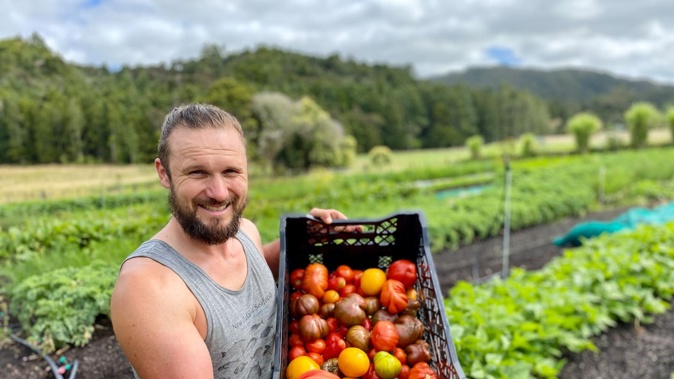
Northland was very dry, hot and windy during December and the dry weather is set to continue until the end of next week
December’s weather tops off a very dry 2024 in the north, with Dargaville recording its lowest annual rainfall, according to the National Institute of Water and Atmospheric Research (Niwa).
But while water restrictions and windy weather may be a thorn in the side for holidaymakers, Northland growers say their crops are thriving thanks to the lack of extreme heavy rain seen in past summers.
Niwa’s climate summary for December shows Northland was warm for the month, with Kaitāia, Kerikeri, Purerua in the Bay of Islands, Kaikohe and Whangārei having near-record high temperatures.
Cape Rēinga recorded its highest extreme minimum temperature for December, while Dargaville posted a near-record extreme wind gust.
Niwa meteorologist Chris Brandolino said 2024 was very dry in Northland, with Dargaville having its driest year since 1943, with 788mm of rain.
 Niwa meteorologist Chris Brandolino says it is not forecasting a drought for Northland.
Niwa meteorologist Chris Brandolino says it is not forecasting a drought for Northland.
“This is 72% of normal, so it’s not even three-quarters of what’s considered normal.”
Whangārei also had its second-driest year and Kaitāia had its fourth-driest year.
The dry weather was caused by more west-to-southwest winds over the year that did not bring as much moisture to Northland as the northerly or northeast winds, Brandolino said.
It resulted in all of Northland being ranked “very dry” in the New Zealand Drought Index and Te Hiku peninsula being “extremely dry”.
Dargaville and Baylys Beach are under a level 3 water restriction, which bans the use of hoses, sprinklers, irrigation systems and water blasters.
Level 3 restrictions start on Monday for Ōmanaia-Rāwene and Ōpononi-Ōmāpere.
Level 2 water restrictions, banning the use of outdoor sprinklers or irrigation systems, are also in place in Kawakawa-Moerewa.
From Monday level 2 water restrictions apply in Kerikeri-Waipapa and Paihia-Ōpua-Waitangi.
Brandolino said the dry weather would probably continue for the next 10-14 days, but there would be more chance of rain after the end of next week.
“For folks looking for rain because they’re on tank water or they’re a farmer or just for the fire risk, in the second half of January the indications are the opportunities for rain will increase.”
 2024 Northland weather records
2024 Northland weather records
Niwa was not forecasting a drought for Northland, he said.
“Out expectation for the next three months – for January, February and March – is for rainfall to be normal or above normal. It seems unlikely that the dryness that we have experienced, and will be present for the next 10 days, will continue in the medium-to-long term.”
Temperatures were likely to be higher than normal, Brandolino said.
He was unable to predict if Northland would be impacted by an ex tropical cyclone this year because it was unclear where in the country the systems could hit.
Weather seeds good growth, gardeners say
Northland growers say while the season has been a little changeable, it has generally been very good.
Market gardener Gus Ross, of Left Fields in Waipu, said the settled weather this summer had been a welcome reprieve from the extreme weather experienced over the past few years.
Left Fields is cheering a lack of heavy rain, which has washed out crops in previous summers, says Gus Ross. Photo / Denise Piper
The business began in 2020, and had experienced regular floods, where rainfall of at least 100mm washed out garden beds, destroying crops, he said.
This summer has been more forgiving and, while there have been some windy days, Ross said it had been mostly warm and not too hot.
Mesclun mix, pea shoots and lettuces had been growing well and baby spinach – which normally stops growing in the height of summer – was growing better than normal, he said.
Ross said tomatoes growing under cover had been harvested since the end of November, making them a couple of weeks early.
This means Left Fields customers, including restaurants in Bream Bay and Whangārei, and shops Putiputi Ra and Origin Northland, had been fully stocked with goods, he said.
Blueberries also started ripening a couple of weeks earlier than normal, according to Greg Furniss, of Blueberry Country Waipu.
“It’sgenerally been a good season for us. We’ve got a good crop and started one week to 10 days early.”
However, Whangārei Growers’ Market co-founder Murray Burns said some growers had been struggling with the cold spring and cooler nights.
Blueberries sold at the markets were later than normal, many of the strawberries were smaller than normal and melons had been fewer, he said.
“The weather has been changing rapidly because of climate change and sometimes we’re struggling to keep up.”
Denise Piper is a news reporter for the Northern Advocate focusing on health and business. She has more than 20 years in journalism and is passionate about covering stories that make a difference.
Take your Radio, Podcasts and Music with you









